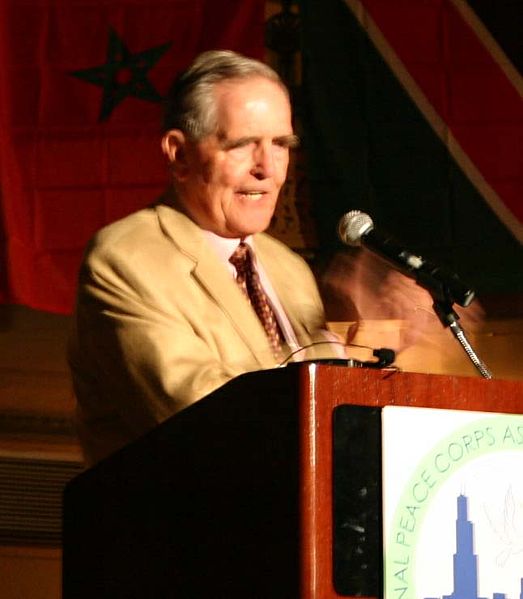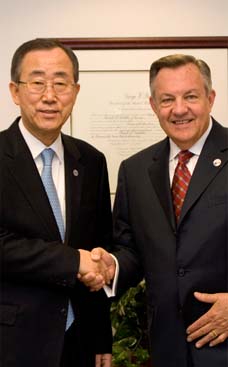2005.03.01: March 1, 2005: Headlines: Directors: COS - Korea: Kenyon College: Kevin O'Donnell never imagined that he would be waging an all-out war for the agency's survival-as its director
Peace Corps Online:
Peace Corps News:
Directors of the Peace Corps:
Kevin O'Donnell:
January 23, 2005: Index: PCOL Exclusive: Peace Corps Directors - O'Donnell :
2005.03.01: March 1, 2005: Headlines: Directors: COS - Korea: Kenyon College: Kevin O'Donnell never imagined that he would be waging an all-out war for the agency's survival-as its director
Kevin O'Donnell never imagined that he would be waging an all-out war for the agency's survival-as its director

His mandate was to establish educational programs in English, math, science, and physical education. Health care projects would come later. Working with several government ministries, a process that required considerable tact, he began to piece together a quiltwork of offerings that accommodated Korean needs while making the best use of the eventual 300-plus American volunteers in the operation. Given the nature of the Corps' mission and the harsh conditions for volunteers, O'Donnell found himself rethinking the authoritarian management approach then in vogue in private industry. Managing volunteers, he discovered, was all about stimulation and very little about decree. "By and large, people who applied to the Peace Corps had energy and ability, and my biggest job was to point them in the right direction and then get the hell out of the way," O'Donnell says. Kevin O'Donnell was the fourth Director of Peace Corps serving from July 1, 1971 to September 30, 1972.
Kevin O'Donnell never imagined that he would be waging an all-out war for the agency's survival-as its director
Kevin O'Donnell '47 H'90
Learning to Stay Afloat
When Kevin O'Donnell '47, H'80, P'84 agreed to set up the Peace Corps program in South Korea in the mid-1960s, he never imagined that five years later he would be waging an all-out war for the agency's survival-as its director.
A wartime enrollee at Kenyon who never finished high school and spent just two semesters on campus, O'Donnell served in the U.S. Navy Supply Corps and earned an MBA at Harvard before going to work for SIFCO and Atlas Alloys, both Cleveland metal-working and steel concerns, separated by a stint with the consulting company Booz, Allen & Hamilton.
But he had also lost his first wife following the birth of their sixth child, battled alcoholism, and remarried the widow of a Navy buddy. When O'Donnell happened on a newspaper article about paid staff managers in the nascent Peace Corps, he jumped at the opportunity to do something different. "I was at a point in my life when I wished to be more mission- than profit-oriented," he recalls. In 1966, together with his second wife, Ellen, a merged family of eight children, and forty-eight pieces of luggage, O'Donnell set off for Seoul. It was his first trip overseas.
Today, he chuckles at his assumption that management success in the United States would easily translate in a foreign setting. "I thought, 'Well, it's another job.' I was pretty naïve."
Because each host nation has such different needs and wants, there was no single recipe for establishing a program. Unlike his U.S. embassy and military peers, O'Donnell had to rely on the local Korean economy for staff, housing, and office space. The language was difficult to master, the culture an enigma to most Americans.
"You went in and you sank or swam," says O'Donnell of his first months on the job. He quickly learned how to stay afloat.
His mandate was to establish educational programs in English, math, science, and physical education. Health care projects would come later. Working with several government ministries, a process that required considerable tact, he began to piece together a quiltwork of offerings that accommodated Korean needs while making the best use of the eventual 300-plus American volunteers in the operation.
Given the nature of the Corps' mission and the harsh conditions for volunteers, O'Donnell found himself rethinking the authoritarian management approach then in vogue in private industry. Managing volunteers, he discovered, was all about stimulation and very little about decree. "By and large, people who applied to the Peace Corps had energy and ability, and my biggest job was to point them in the right direction and then get the hell out of the way," O'Donnell says.
When his tour was over, O'Donnell didn't have definitive plans. The agency needed help back at headquarters in Washington, D.C., so he agreed to become director of administration and finance, acting deputy director, and finally, in 1971, director of the Peace Corps.
He ran right into a crisis, in the form of Representative Otto Passman of Monroe, Louisiana, who despised the Peace Corps and made it his mission, as chairman of an appropriations subcommittee, to bleed the agency's budget.
O'Donnell worked day and night to marshal forces against the cuts. Morale plummeted among his colleagues. All he could do was to "keep them aware of where we stood and that we were fighting like hell," he recalls. In the end, Congress did slash his budget, but President Nixon stepped in, transferring funds to fill the gap. O'Donnell did not have to bring home any volunteers on his watch.
Because he felt very strongly about the Peace Corps' non-careerist orientation-to maintain freshness, the agency allowed most staffers to stay just five years-O'Donnell, as a presidential appointee, agreed to a one-year extension but left in May of 1972, six years to the day after he signed up. But the O'Donnell legacy didn't end there.
Links to Related Topics (Tags):
Headlines: March, 2005; Kevin O'Donnell; Peace Corps Directors; Peace Corps Korea; Directory of Korea RPCVs; Messages and Announcements for Korea RPCVs
When this story was posted in October 2007, this was on the front page of PCOL:





Peace Corps Online The Independent News Forum serving Returned Peace Corps Volunteers 
 | Dodd vows to filibuster Surveillance Act
Senator Chris Dodd vowed to filibuster the Foreign Intelligence Surveillance Act that would grant retroactive immunity to telecommunications companies that helped this administration violate the civil liberties of Americans. "It is time to say: No more. No more trampling on our Constitution. No more excusing those who violate the rule of law. These are fundamental, basic, eternal principles. They have been around, some of them, for as long as the Magna Carta. They are enduring. What they are not is temporary. And what we do not do in a time where our country is at risk is abandon them." |
 | What is the greatest threat facing us now?
"People will say it's terrorism. But are there any terrorists in the world who can change the American way of life or our political system? No. Can they knock down a building? Yes. Can they kill somebody? Yes. But can they change us? No. Only we can change ourselves. So what is the great threat we are facing? I would approach this differently, in almost Marshall-like terms. What are the great opportunities out there - ones that we can take advantage of?" Read more. |
 | Senator Dodd's Peace Corps Hearings
Read PCOL's executive summary of Senator Chris Dodd's hearings on July 25 on the Peace Corps Volunteer Empowerment Act and why Peace Corps Director Ron Tschetter does not believe the bill would contribute to an improved Peace Corps while four other RPCV witnesses do. Highlights of the hearings included Dodd's questioning of Tschetter on political meetings at Peace Corps Headquarters and the Inspector General's testimony on the re-opening of the Walter Poirier III investigation. |
 | Paul Theroux: Peace Corps Writer
Paul Theroux began by writing about the life he knew in Africa as a Peace Corps Volunteer. His first first three novels are set in Africa and two of his later novels recast his Peace Corps tour as fiction. Read about how Theroux involved himself with rebel politicians, was expelled from Malawi, and how the Peace Corps tried to ruin him financially in John Coyne's analysis and appreciation of one of the greatest American writers of his generation (who also happens to be an RPCV). |
 | Ambassador revokes clearance for PC Director
A post made on PCOL from volunteers in Tanzania alleges that Ambassador Retzer has acted improperly in revoking the country clearance of Country Director Christine Djondo. A statement from Peace Corps' Press Office says that the Peace Corps strongly disagrees with the ambassador’s decision. On June 8 the White House announced that Retzer is being replaced as Ambassador. Latest: Senator Dodd has placed a hold on Mark Green's nomination to be Ambassador to Tanzania. |
 | Suspect confesses in murder of PCV
Search parties in the Philippines discovered the body of Peace Corps Volunteer Julia Campbell near Barangay Batad, Banaue town on April 17. Director Tschetter expressed his sorrow at learning the news. “Julia was a proud member of the Peace Corps family, and she contributed greatly to the lives of Filipino citizens in Donsol, Sorsogon, where she served,” he said. Latest: Suspect Juan Duntugan admits to killing Campbell. Leave your thoughts and condolences . |
 | He served with honor
One year ago, Staff Sgt. Robert J. Paul (RPCV Kenya) carried on an ongoing dialog on this website on the military and the peace corps and his role as a member of a Civil Affairs Team in Iraq and Afghanistan. We have just received a report that Sargeant Paul has been killed by a car bomb in Kabul. Words cannot express our feeling of loss for this tremendous injury to the entire RPCV community. Most of us didn't know him personally but we knew him from his words. Our thoughts go out to his family and friends. He was one of ours and he served with honor. |
Read the stories and leave your comments.

Some postings on Peace Corps Online are provided to the individual members of this group without permission of the copyright owner for the non-profit purposes of criticism, comment, education, scholarship, and research under the "Fair Use" provisions of U.S. Government copyright laws and they may not be distributed further without permission of the copyright owner. Peace Corps Online does not vouch for the accuracy of the content of the postings, which is the sole responsibility of the copyright holder.
Story Source: Kenyon College
This story has been posted in the following forums: : Headlines; Directors; COS - Korea
PCOL38823
62














